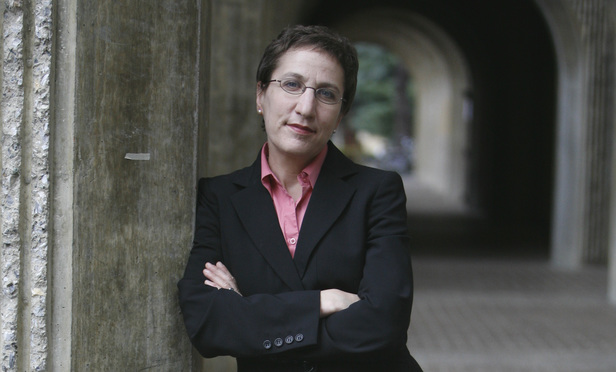 Michele Landis Dauber, professor of law and sociology at Stanford Law School. (Shelley Eades)
Michele Landis Dauber, professor of law and sociology at Stanford Law School. (Shelley Eades)
Following the urging of three prominent law professors, Stanford University’s student senate on Wednesday adopted a resolution demanding the reinstatement of an outside lawyer who was dismissed after she publicly criticized the school’s procedure for resolving sexual assault complaints.
The professors backed the resolution condemning the termination of attorney Crystal Riggins, arguing that her dismissal was improper and retaliatory. Legal ethics expert Deborah Rhode, college campus assault expert Michele Dauber, and intellectual property specialist Mark Lemley each signed a letter urging the student senate to formally call for Riggins’ reinstatement.
“We do not believe that it is appropriate to terminate an attorney for advocacy that the attorney believes is in her client’s best interest,” according to the letter, also signed by sociology professor Shelley Correll and comparative literature professor David Palumbo-Liu. “Nor is it constructive for the university to silence critics rather than learn from their concerns.”
Riggins, an attorney with San Francisco firm Hoge Fenton Jones & Appel, was on the roster of six lawyers Stanford keeps under contract to represent complainants and those accused of sexual assault on campus. She was terminated by the university on Jan. 31, a month after she was quoted in The New York Times saying Stanford’s policy requiring all three members of a panel to agree in order to find an accused student responsible for sexual assault is too high a bar. “It is very difficult to get a 3-0 decision from a panel, and these young women are terrified and traumatized and just want it to be done,” Riggins told the Times. The unanimous decision provisions incentivize sexual assault victims to settle, Riggins contended.
Lauren Schoenthaler, the Stanford administrator who oversees the university’s Title IX compliance program, called Riggins’ comments “disappointing” in an email terminating her contract, a copy of which the professors included in their letter.
“This has driven a wedge between survivors of sexual assault and the administration, such that I now feel concern that victims of sexual assault will not trust Stanford to fairly adjudicate their complaints and will not come to us,” Dauber said in an interview Thursday. “Whatever their intentions were, this was just counterproductive and potentially dangerous.”
University representatives did not respond to requests for comment on the student senate resolution or Riggins’ current status.
The situation highlights several problems with Stanford’s sexual assault adjudication process in addition to the relatively high burden placed on complainants of securing unanimous panel decisions, Dauber said. (According to The New York Times, Stanford’s sexual assault finding standard is one of the highest among the country’s top 20 universities as determined by U.S. News & World Report—only Duke University has the same requirement that panel decisions be unanimous.)
The university’s hiring of lawyers on behalf of students creates a potential conflict of interest, Dauber said, given that professional responsibility rules dictate that lawyers’ sole responsibility is to their client, even if the legal bills are being paid by a third party. Riggins was advocating for her client when she spoke out against Stanford’s process, yet Stanford interfered by firing her, Dauber said.
It would be fairer for Stanford to provide grants for students to hire their own, truly independent counsel, she added.
Dauber also contends that the monetary cap Stanford places on student cases—a maximum of $1,800 for the lawyers who take on those cases—creates another incentive for cases to settle rather go on to hearings and appeals. Stanford pays lawyers for a maximum of nine hours of work per case, which is far less time than sexual assault cases typically require, she said.
“Interfering with an attorney who is trying to exercise her professional judgment and advocate for her client is completely unacceptable,” Dauber said. “I and my colleagues are going to continue to weigh in in whatever way we think we can be effective to persuade Stanford that it’s on the wrong course here.”
Contact the reporter at [email protected]. On Twitter: @KarenSloanNLJ




